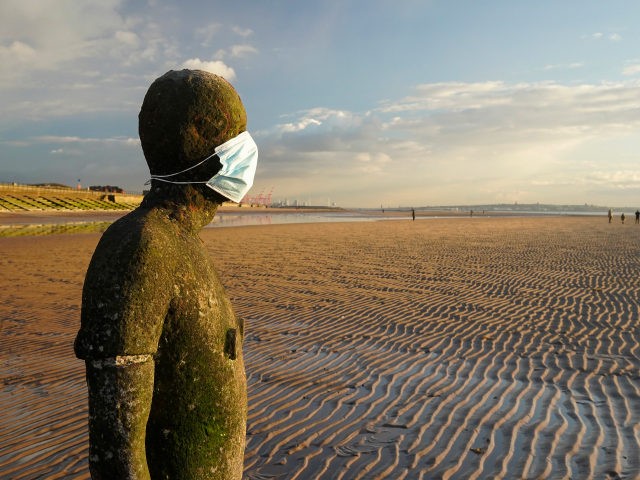An astonishing 83 per cent of Britons have said that if wearing a mask in public were a “personal choice”, they would do so, after another recent poll revealed that despite the mask mandate possibly coming to an end this month, the majority back it staying in place and even feel unsafe without them.
The YouGov poll from Tuesday found that a combined 83 per cent said they would wear a mask if it were a personal choice today. Four in ten said they would wear them only indoors, with 30 per cent saying they would only wear them inside if the space were crowded or unventilated. More than one in ten — 13 per cent — took the most extreme option and said they would wear a mask indoors and outdoors.
Just 13 per cent said they would not wear one at all.
83% of the public say they'd wear a face mask if it was a personal choice today
– 13% would indoors and outdoors
– 40% would only indoors
– 30% would only in indoor crowded or unventilated places
– 13% wouldn't wear one at allhttps://t.co/HzlsQMattD pic.twitter.com/k13Om4W26b— YouGov (@YouGov) July 6, 2021
Another poll from Monday from YouGov — one of Britain’s largest pollsters which was co-founded by the now-vaccine minister, Nadhim Zahawi — claimed, on the day that Prime Minister Boris Johnson announced the end of all restrictions, that 71 per cent thought that masks should continue to be mandatory on public transport with 66 per cent believing masks should continue to be compulsory in shops, as well.
A combined 70 per cent had also admitted they would feel “less safe” in a crowded or poorly-ventilated place if others were not covering their faces.
The latest polls are largely in line with the claimed responses of Britons to the pandemic and the government’s handling of it over the past year, revealing many to be fearful and backing limits on their own freedoms.
In September 2020, two-thirds said they would support a night-time curfew, with 83 per cent saying they were frightened of a second wave “hitting the UK hard”.
That same month, 63 per cent said Johnson’s restrictions did not go far enough, with an anonymous Conservative MP saying at the time that Britons had been driven “fearful” by the government’s messages on the risks of the Chinese coronavirus and, as a result, were influenced to back “authoritarian” measures.
A November YouGov poll found that a majority (54 per cent) of Conservatives were in favour of forcing everyone to have vaccinations against COVID-19, with nearly half (49 per cent) of all Britons backing the suggestion.
In January, a plurality, 46 per cent, of Britons did not think that police were cracking down hard enough on alleged coronavirus rule-breakers, with just 14 per cent saying policing was “too strict”.
A series of social media ads which aim to shock Britons into staying locked in their homes claim buying a cup of coffee could "cost lives". https://t.co/U5sHM5DBK8
— Breitbart News (@BreitbartNews) January 15, 2021
January also saw a poll revealing nearly half (45 per cent) of the British public backed the government spying on the phone data of those under lockdown restrictions. Forty-nine per cent also said that month that workplaces should be allowed to insist that their employees be vaccinated.
In March, lockdown sceptic and Conservative MP Sir Desmond Swayne said he found it “unnerving” the “enthusiasm with which people have embraced the diminution of their civil liberties and their ordinary lives”.
Britons were not always so fearful, however, with a YouGov poll from March 13th, 2020, finding that most people were unconcerned by the Chinese virus.
This attitude had not escaped the attention of those advising the government.
A paper dated March 22nd, 2020, prepared for the Scientific Advisory Group on Emergencies (SAGE), the influential body that counsels the government on its pandemic strategy, wrote that fear could be used to encourage Britons into accepting and following restrictions.
'Emotionally Manipulative Propaganda': UK Govt Releases 'Stay Home' Coronavirus Scare Video https://t.co/gY4LmQjiP0
— Breitbart London (@BreitbartLondon) January 23, 2021
Under a section of the report headed “Persuasion”, the authors wrote, “Perceived threat: A substantial number of people still do not feel sufficiently personally threatened” by the virus.
In emboldened text, the report recommended: “The perceived level of personal threat needs to be increased among those who are complacent, using hard-hitting emotional messaging. To be effective this must also empower people by making clear the actions they can take to reduce the threat.”
Such tactics to frighten Britons into accepting measures include the government’s ad campaigns. One form January claimed that seeing friends for a coffee could “cost lives”. The highly emotive campaign from the same month showing dramatic video of coronavirus patients in hospital, demanding people “Stay home. Protect the NHS. Save Lives”, was labelled “emotionally manipulative propaganda” by London Assembly Member David Kurten.
Former Conservative Party leader Sir Iain Duncan Smith, a vocal critic of the government’s lockdown strategy, has also called for the end of the media’s and the government’s daily death tolls by coronavirus, which in recent months has been in the double and single digits, saying they give a “distorted view” of life and death in the UK.
“I don’t run the BBC, but I would certainly say, ‘Why are you constantly doing this?’ Because it simply just feeds people perspective that there is something to be desperately scared of and feared, when in actual fact we have a way out of all this,” Mr Duncan Smith said.
‘Distorted View’ of Life and Death in the UK: IDS Calls for End of Daily Coronavirus Death Reports https://t.co/xX0e7POWH7
— Breitbart London (@BreitbartLondon) July 2, 2021

COMMENTS
Please let us know if you're having issues with commenting.